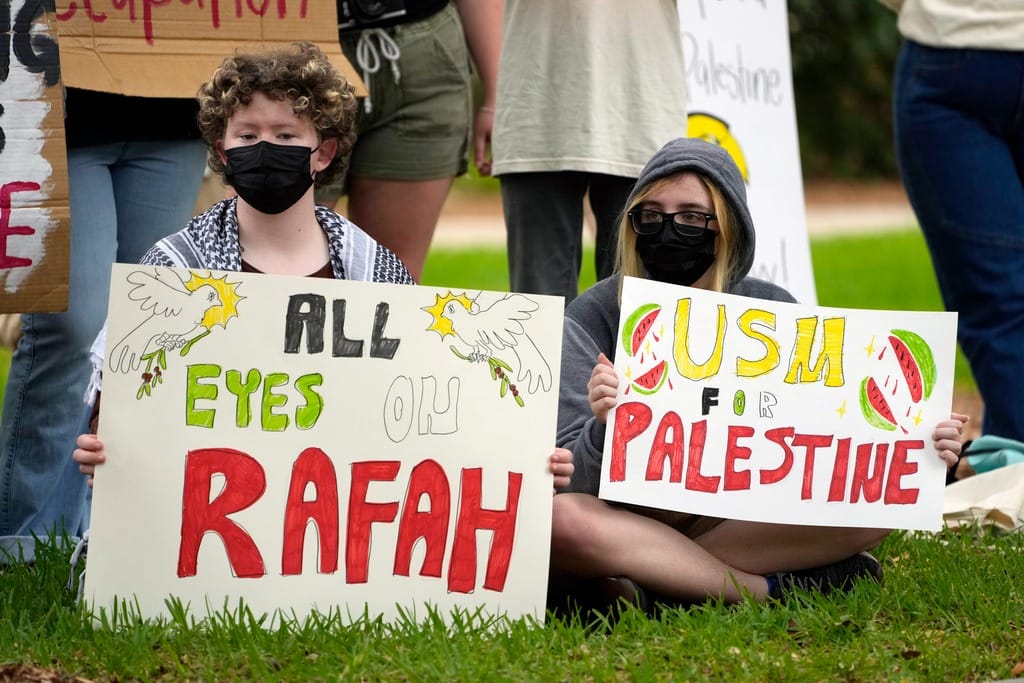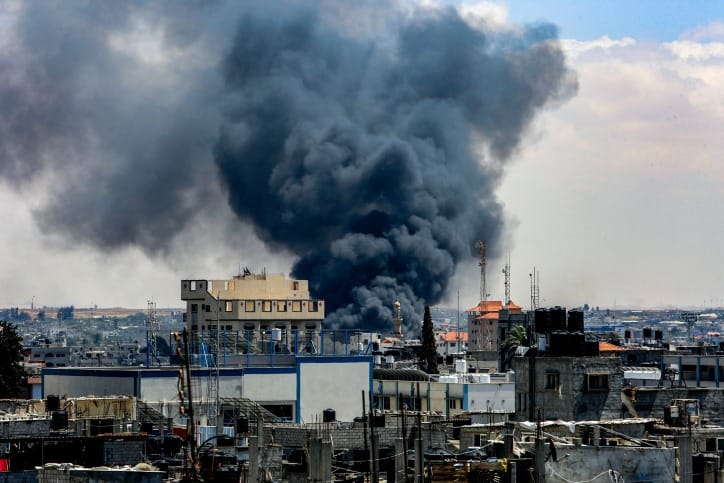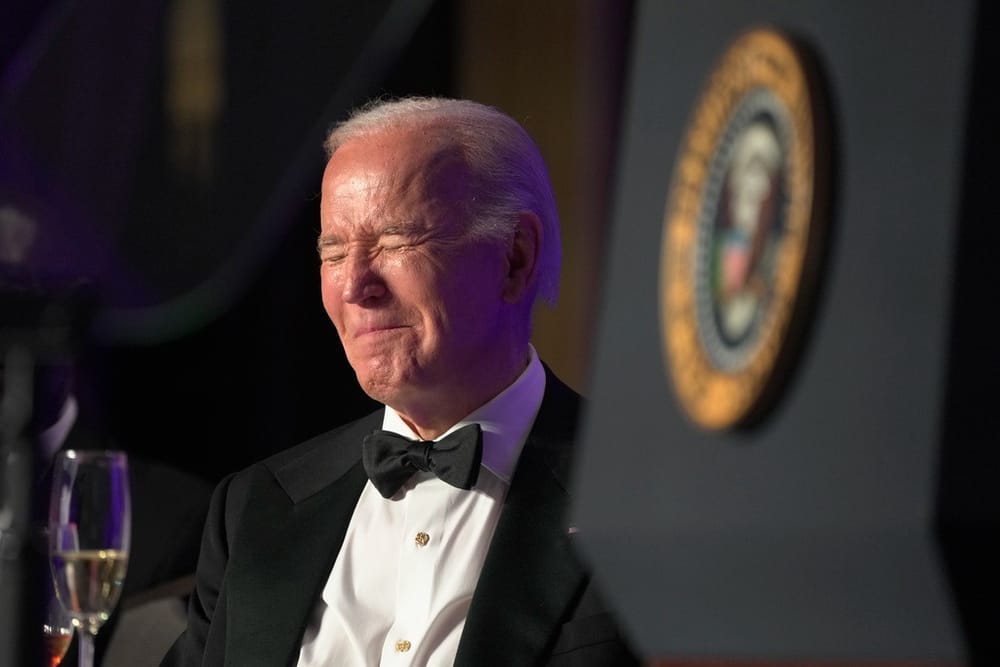Expert on Arab affairs Marianna Belenkaya writes about Hamas's version of the hostage deal, Egypt's role as a mediator, and Biden's decision to stop US weapons supplies to Israel
Hamas has presented its ceasefire plan for the Gaza Strip, while Israel has commenced a limited operation in Rafah. Against this backdrop, mediators made another attempt this week to bridge the parties' positions, but so far, they have not succeeded. The working teams left Cairo without reaching a compromise; however, Arab media, citing sources, reported that negotiations will soon resume. Preliminary information suggests this will occur in Doha, which has recently sent ambiguous signals about its mediating role. This may be linked to hopes for the eventual success of the negotiations. Meanwhile, Arab mediators are very hopeful that the USA will continue to press Israel.
Hamas's proposals
On Monday evening, Hamas unexpectedly agreed to accept proposals for a ceasefire. Ismail Haniyeh, the head of Hamas's political bureau, personally informed Qatar's Prime Minister Mohammed Al-Thani and the head of Egyptian intelligence, Abbas Kamel—both key negotiators—and several regional politicians. It was claimed that these were proposals developed by Qataris and Egyptians. Almost immediately, it became apparent that the agreement text presented by Hamas had been altered compared to the document that the media previously claimed had been approved by Israel. In response, Israel declared that changes to the agreement terms had been made without their knowledge.
The proposals from Hamas were published in full in several Arab media outlets, but no official documents prepared by Israel were available, only separate leaks of information. However, these leaks suffice to highlight the differences between the two approaches. The Middle East Media Research Institute (MEMRI) analyzed the sides' positions based on two documents: Hamas's proposals from May 6 and the Egyptian proposals that appeared a week earlier in Arab media, which reportedly largely satisfied Israel.
Here are the key differences:
In the first phase of the deal, Hamas is willing to return at most 33 hostages to Israel, regardless of whether they are alive or deceased. Israel will only learn exactly how many hostages will be released and who they are after the agreement has been implemented. Meanwhile, Israel has recently demanded the return of 33 live hostages in the first phase, which was already a compromise from the initial demand for 40 hostages.
Hamas has also increased the number of Palestinian prisoners that Israel must release in exchange for its hostages. It insists that the Israeli authorities cannot alter the lists provided by Hamas for the exchange. Israel is also required to guarantee that if anyone released is re-arrested, they will not be tried based on old charges. It is important to note that many of the Palestinians whose release Hamas demands have been sentenced to life imprisonment for murdering Israelis. Additionally, Hamas has removed from the Egyptian plan a proposal that stated each prisoner serving a life sentence would be sent either to the Gaza Strip or outside Palestinian territories. Instead, Hamas wants the released prisoners to also return to areas currently controlled by the official Palestinian Authority in Ramallah, thereby hoping to strengthen its influence on the West Bank.
Hamas has also removed from the text all clauses aimed at preventing the restoration of its military potential in the Gaza Strip, including the stipulation that only "unarmed civilians" would be allowed to return to their homes in the northern sector.
Hamas is also expanding the role of the UN as a guarantor of the deal's implementation and insists on the continuation of UNRWA's operations in the Gaza Strip. Another new requirement is compensation for all individuals affected by the war.
Hamas also demand a sustainable ceasefire and the withdrawal of Israeli forces from the Gaza Strip. Mediators insist on this as well. However, the options they proposed to Israel were more flexible in terms of timing and conditions than those in the Hamas version.
Nonetheless, the mediators perceived the appearance of Hamas's version and statements by Ismail Haniyeh as positive developments and a basis for continuing negotiations. It was claimed that the differences were insignificant and compromises were possible. Israel also agreed to talk. Consequently, indirect negotiations resumed in Cairo with the involvement of Egyptian, Qatari, and American mediators.
The backdrop of the negotiations was the ongoing Israeli operation in the Rafah area. Israeli authorities emphasized that these were limited military actions, but they could be expanded at any moment. Hamas and the mediators warned that the Rafah operation undermined the negotiation process. Still, it appeared as merely a threat and, at the same time, a convenient excuse for Hamas to retreat at any moment.
In any case, the consultations in Cairo, which lasted several days, ended inconclusively. However, on Wednesday, the Qatari newspaper Al-Araby Al-Jadeed reported that the number of contentious issues between the parties had decreased, leaving two principal matters: Israel insists that the ceasefire should only commence in the second phase of the deal, and all 33 hostages to be returned in the first phase must be alive.
Meanwhile, information is constantly changing; for example, one of the latest reports on Friday morning included Hamas's demands to extend the duration of the temporary ceasefire.
Between Cairo and Doha
On Friday, Al-Araby Al-Jadeed also reported that negotiations will continue next week, but this time in Doha instead of Cairo. The Qatari Prime Minister reportedly asked CIA Director William Burns for the change of location.

In this context, it should be said that at the end of April, Doha threatened to reassess its role as a mediator between Israel and Hamas. After this, Cairo came to the forefront. Israel was pleased with the development, as Qatar has never been fully trusted due to its closeness to Hamas. Egypt, on the other hand, acts as a more neutral mediator. Moreover, Cairo has never had affection for Hamas, which has its roots in the Muslim Brotherhood movement, which is considered a security threat by the Egyptian authorities.
However, Qatari representatives did not withdraw from the negotiations and continued to participate in all rounds of consultations. Additionally, Turkey, whose positions are almost entirely aligned with those of Qatar, joined the talks in one form or another. The two countries have long presented a united front on many Middle Eastern issues and share a similar affinity for the ideology of the Muslim Brotherhood.
Now, if leaks from Al-Araby Al-Jadeed are to be believed, Doha wants to return to an active mediating role. This may be due to emerging hopes that the parties will eventually be forced to find a compromise. In such a case, Qatar wants to reap all the dividends, not just give Egypt the victor's role.
Coordination with Egypt
Against this background, leaks from Al-Araby Al-Jadeed, which is important to remember is published in London with Qatari funding, and the Lebanese newspaper Al-Akhbar, close to Hezbollah, are of interest. They reported that Israel warned Cairo about the commencement of military operations in Rafah.
On Friday, Al-Akhbar reported that Israel informed the Egyptian side about the continuation of military operations on the border with the city of Rafah. Specifically, Egypt was given information about the number of Israeli soldiers involved in the operation and the type and quantity of weaponry and tanks. The publication also writes about Israel's plans to gradually expand the operation in Rafah gradually but to do so in a manner that would not further deteriorate relations with the USA and other countries that oppose such actions. Against this background, Cairo is asking Washington to exert serious pressure on Israel.
Earlier in the week, Al-Araby Al-Jadeed claimed that the start of the operation in Rafah, including the deployment of Israeli forces along the Philadelphi Corridor (on the border between the Gaza Strip and Egypt) and towards the Rafah Border Crossing, was coordinated with the USA after notifying Egypt. According to the newspaper, the American administration gave Israeli Prime Minister Benjamin Netanyahu the green light for a limited short-term operation to create an appearance of victory. It was anticipated that afterward, it would be easier for Netanyahu to concede at the negotiations or, instead, to convince his coalition partners from the extreme right parties of the need for such talks. At least, this is how it was "sold" to Cairo, convincing it to tolerate Israeli actions for the success of negotiations under its auspices. However, after the round of consultations this week ended without results, there were leaks that now Egypt, like Qatar earlier, wants to threaten to reconsider its role as a mediator. Here, as we can see, Doha is becoming active again.
The question remains – how justified are all these hopes? Moreover, Israeli media reported on Friday that the war cabinet had approved the measured expansion of the IDF's operation in Rafah. According to the information from the Gaza Strip, this is happening.
Washington's vacillations
Based on media reports, Arab mediators place significant hopes on Washington. Not only the mediators but also Hamas are hopeful due to the US halting the delivery of over 3,500 bombs to Israel. This move by President Joe Biden's administration is intended to prevent Israel from expanding its operations in Rafah.
In Israel, this decision was received negatively—as encouragement for Hamas. Prime Minister Netanyahu also stated that Israel is prepared to fight alone if Washington withdraws its support. Israeli military officials assert that they have sufficient weapons for the Rafah operation. However, the suspension of one arms shipment might lead to others.

Moreover, how Israel's opponents perceive the US signals is even more crucial. For now, the incident provides them with a reason for joy.
However, American signals are mixed. On the one hand, the US shows it will pressure Israel regarding humanitarian issues in Gaza and the expansion of combat operations there. On the other, Washington acknowledges its continued support for Israel in defense and its efforts to destroy Hamas's military infrastructure in Gaza.
Despite Netanyahu's bold declarations, he seems to heed signals from Washington. This is evident from the increased humanitarian aid to Gaza and the limited scope of the Rafah operation. Nonetheless, the situation in US-Israel relations is complex and will remain so at least until the end of the US presidential campaign. The outcomes could vary and will depend on many factors—the internal dynamics in the US, the situation in Israel, and what Hamas leadership considers beneficial.
In this context, it's hard to disagree with Michael Young, a senior editor at the Malcolm H. Kerr Carnegie Middle East Center in Beirut, who writes that both Netanyahu and Yahya Sinwar, the head of Hamas in Gaza, are interested in continuing the conflict until they can secure a clear victory that ensures their political survival.












